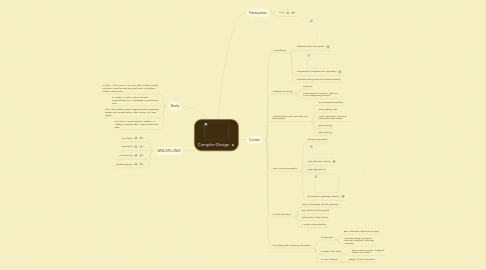
1. Books
1.1. 1) Alfred V Aho, Monica S. Lam, Ravi Sethi, Jeffrey D Ullman- Compilers- Principles, Techniques and Tools, 2nd edition, Addison-Wesley, 2007.
1.2. 2) Andrew W Apple- Modern Compiler Implementation in C, Cambridge University Press, 2004.
1.3. 3) D.M.Dhamdhere- System Programming and Operating Systems, 2nd revised edition, Tata McGraw - Hill, 2009 reprint.
1.4. 4) Charles N. Fischer, Richard J. leBlanc, Jr.- Crafting a Compiler with C, Pearson Education, 2008.
2. WEB-SITE-LINKS
2.1. IIT-KANPUR
2.2. IIS-Banglore
2.3. VTU E-learning
2.4. FaadooEngineers
3. Prerequisites:
3.1. FAFL
4. Content
4.1. 1) Introduction
4.1.1. Different Phases of Compilers
4.1.2. Comparison of Compilers and Interpreters
4.1.3. Top-down Parsing: RDP and Predictive parsing.
4.2. 2) Bottom-up Parsing
4.2.1. Simple LR
4.2.2. More powerful LR parsers ( LR(0), SLR, LALR), ambiguous grammars.
4.3. 3) Intermediate Code Generation and Optimizations
4.3.1. Syntax-directed translation
4.3.2. Three-address code
4.3.3. Various techniques of machine independent optimization
4.3.4. Type checking
4.3.5. Back patching
4.4. 4) Run-Time Environments
4.4.1. Storage Organization
4.4.2. Stack allocation of space
4.4.3. Heap management
4.4.4. Introduction to garbage collection
4.5. 5) Code Generation
4.5.1. Issues in the design of Code Generator
4.5.2. Basic blocks and Flow graphs
4.5.3. Optimization of basic blocks
4.5.4. A Simple Code Generator.
4.6. 6) Ancillary Code Processing Techniques
4.6.1. • Assemblers
4.6.1.1. Basic Assembler Features & Functions
4.6.1.2. Assembler Design Operations - One-Pass Assembler, Multi-Pass Assembler
4.6.2. • Loaders and Linkers
4.6.2.1. Basic Loader Functions - Design of Loaders and Linkers
4.6.3. • Macro Processor
4.6.3.1. Design of Macro Processors.
